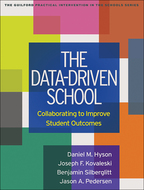The Data-Driven School
Collaborating to Improve Student Outcomes
Daniel M. Hyson, Joseph F. Kovaleski, Benjamin Silberglitt, and Jason A. Pedersen
This title is part of The Guilford Practical Intervention in the Schools Series, edited by Sandra M. Chafouleas.
“This book will appeal to practitioners, trainers, and students of school psychology alike.”
—NASP Communiqué
“Most schools are data rich and assessment poor. If you work at a school that places reams of data into three-ring binders and leaves them sitting on a shelf, this book is a 'must read.' The book shows how to build a culture of data in a school. It is applicable to most settings and provides an excellent model to analyze data for individual students and entire systems. The emphasis on leadership is unique, refreshing, and important for systems change. The systematic use of data to make better decisions is key to most reform efforts and to improving student learning—this book will make that goal a reality.”
—Matthew K. Burns, PhD, Rose and Irving Fein Endowed Professor of Special Education, University of Florida; Assistant Director, University of Florida Literacy Institute
“The Data-Driven School is an exquisite, timely tool to help educators use data confidently and efficiently—and to ensure that 'data-based decision making' is not just a buzz phrase. I recommend this book to any teacher or practitioner who participates on a problem-solving team. The authors provide practical strategies that educators can start using immediately to overcome common teaming challenges and successfully navigate the data inquiry process. I can't wait to share this book with my colleagues and professional network!”
—Jill Battal, PhD, NCSP, Data and Research Coordinator, Comprehensive Behavioral Health Model, Boston Public Schools
“This is a 'go-to' book for any school district trying to improve collective efficacy around data-based decision making. What makes this book different is its comprehensive approach. The authors align systems-level problem solving, data analysis training, technology, and relationships, and present applications at all levels of the school community—district leadership teams, school improvement teams, grade-level teams, and problem-solving teams. Case studies and a summary of key issues in each chapter provide meaningful, job-embedded professional learning opportunities for educators. I highly recommend this book to school psychologists, school leaders, and teacher leaders who want to foster a culture of improvement based on data.”
—Kimberly Gibbons, PhD, Director, Center for Applied Research and Educational Improvement, University of Minnesota
Table of Contents
IntroductionI. The Engine for a Data-Driven School: Systems-Level Problem Solving
1. The Rationale and Context for a Data-Driven School 
2. Systems-Level Problem Identification
3. Systems-Level Problem Analysis
4. Systems-Level Plan Development, Plan Implementation, and Plan Evaluation
II. The Roadmap for a Data-Driven School: Data-Analysis Teaming across Multiple Levels
5. Data-Driven Problem Solving at the Grade, Classroom, and Student Levels: Initial Considerations
6. Implementing Data Teaming at the School and Grade Level for Academic Skills
7. Implementing Data Teaming at the School and Grade Level for Behavior and Social–Emotional Skills
III. Building the Capacity for a Data-Driven School
8. Data Management Using Technology
9. Developing Data Leaders
Appendix 1. Identifying Gaps in Your Comprehensive Assessment System
Appendix 2. Case Example: Setting Your Own Target Scores
Appendix 3. Data Activity
References
Index
About the Authors
Daniel M. Hyson, PhD, NCSP, is Assistant Professor in the School Psychology Graduate Program at the University of Wisconsin–La Crosse. Previously, Dr. Hyson was a school psychologist in Minnesota public schools. He then served as Data Management Coordinator for Hiawatha Valley Education District, a consortium of 13 school districts in southeastern Minnesota. In that role, he consulted with teachers and administrators to help them access, interpret, and use data from academic and behavioral assessments to improve instruction for all students. Dr. Hyson's research interests include teacher–student relationships and their association with student engagement and achievement, and the school psychologist’s role in systems-level consultation and data-driven decision making.Joseph F. Kovaleski, DEd, NCSP, is Professor Emeritus of Educational and School Psychology at Indiana University of Pennsylvania, where he directed the Doctoral Program in School Psychology. Dr. Kovaleski has worked as a school psychologist and district administrator in school districts in Pennsylvania and New Jersey. He directed Pennsylvania’s Instructional Support Team Project and has served as a university consultant for Pennsylvania’s Response to Intervention and Multi-Tiered System of Support initiatives. Dr. Kovaleski’s special areas of expertise include using student data to inform instructional planning and behavior change programs. He has published a number of articles and book chapters on RTI and data-based decision making and presents frequently at national and state conferences. Dr. Kovaleski is a recipient of awards from the National Association of School Psychologists, the Pennsylvania Psychological Association, the Association of School Psychologists of Pennsylvania, and The Pennsylvania State University.
Benjamin Silberglitt, PhD, is Executive Director of Research, Outcomes, and Implementation at Intermediate District 287, a consortium of 11 school districts in the Twin Cities metropolitan area in Minnesota. He has founded, launched, and led the implementation of multiple education technology products since the early 2000s. Dr. Silberglitt is a cofounder of Cedar Labs, a universal data integration platform with statewide implementations in the United States and Australia. He regularly consults with school districts and presents on the effective use of data to support decision making.
Jason A. Pedersen, PhD, NCSP, is a school psychologist in the Derry Township School District in Hershey, Pennsylvania. He has worked with school staff to develop a comprehensive K–12 curriculum to foster and promote resilience, and he previously spearheaded schoolwide positive behavior support, response to intervention (RTI), and multi-tiered systems of support (MTSS) initiatives. Dr. Pedersen is coauthor (with Joseph F. Kovaleski) of a chapter on data-analysis teaming in Best Practices in School Psychology, Sixth Edition, as well as several articles in peer-reviewed journals. He has given numerous presentations on MTSS and RTI at the local, state, and national levels, and has consulted with school districts in Pennsylvania, New York, New Jersey, and Texas.
